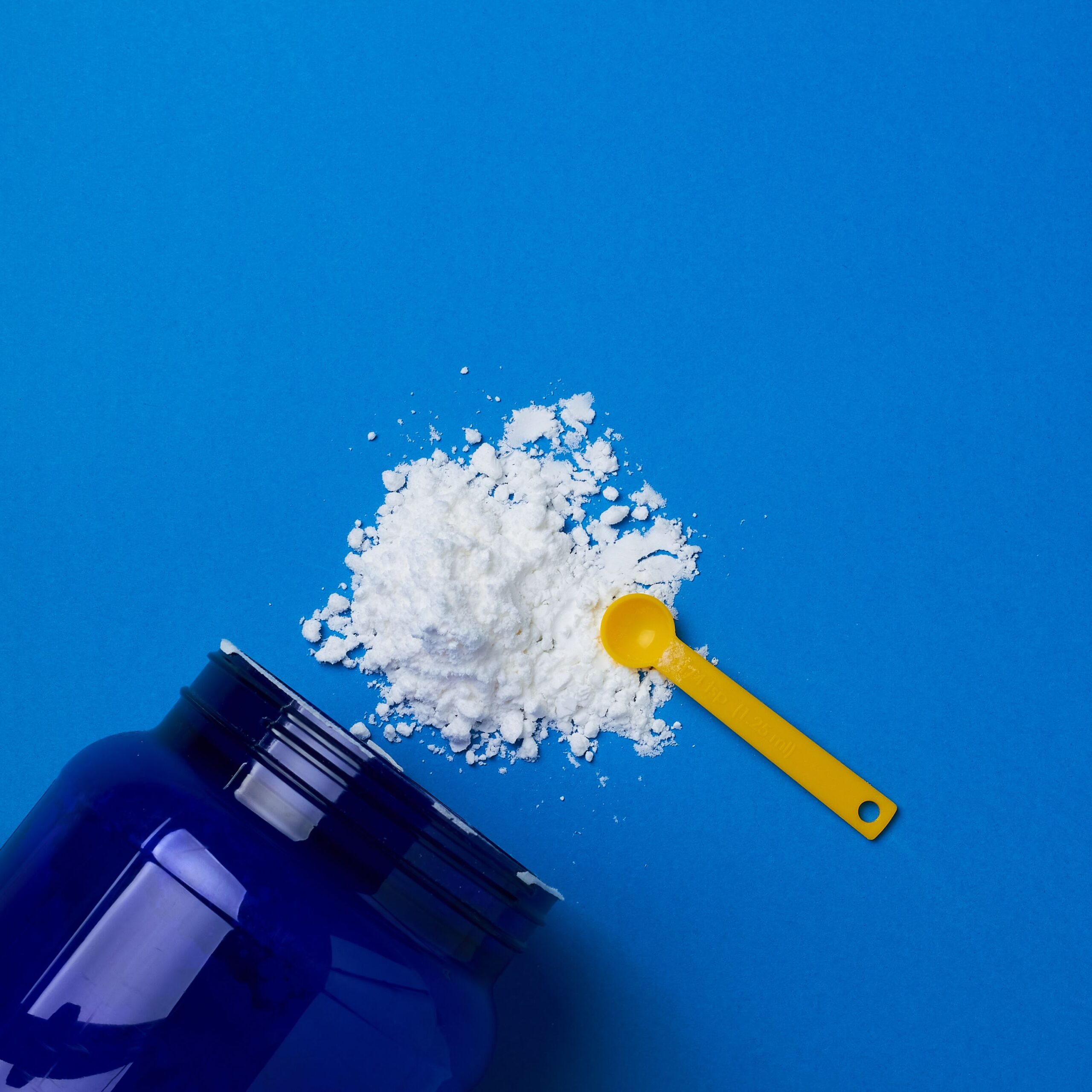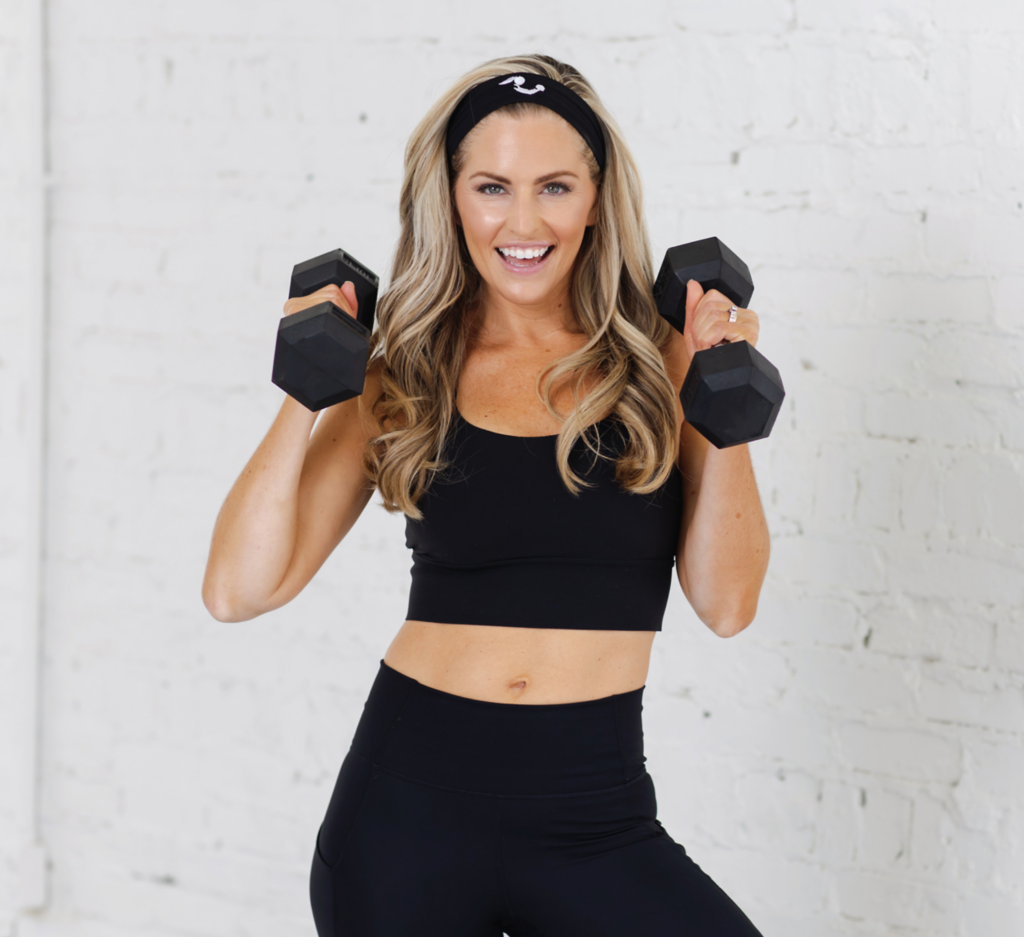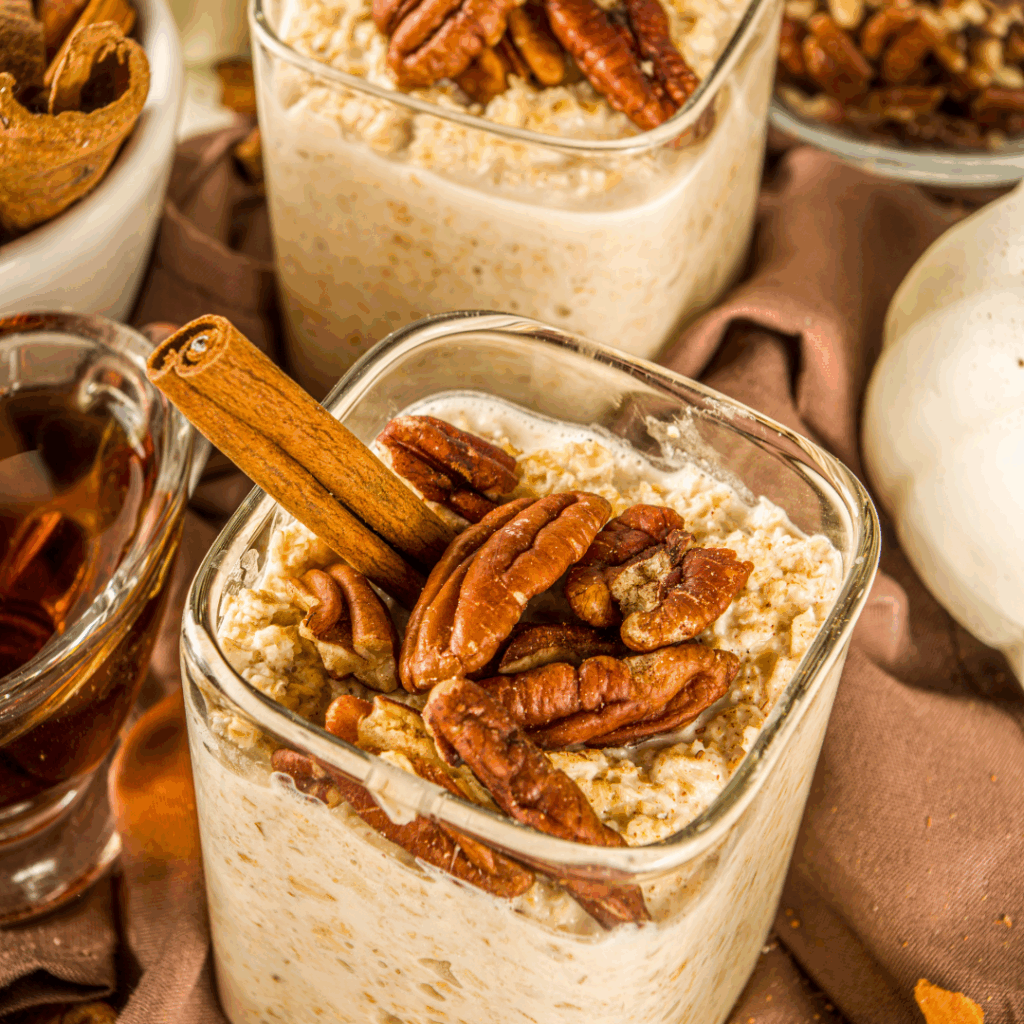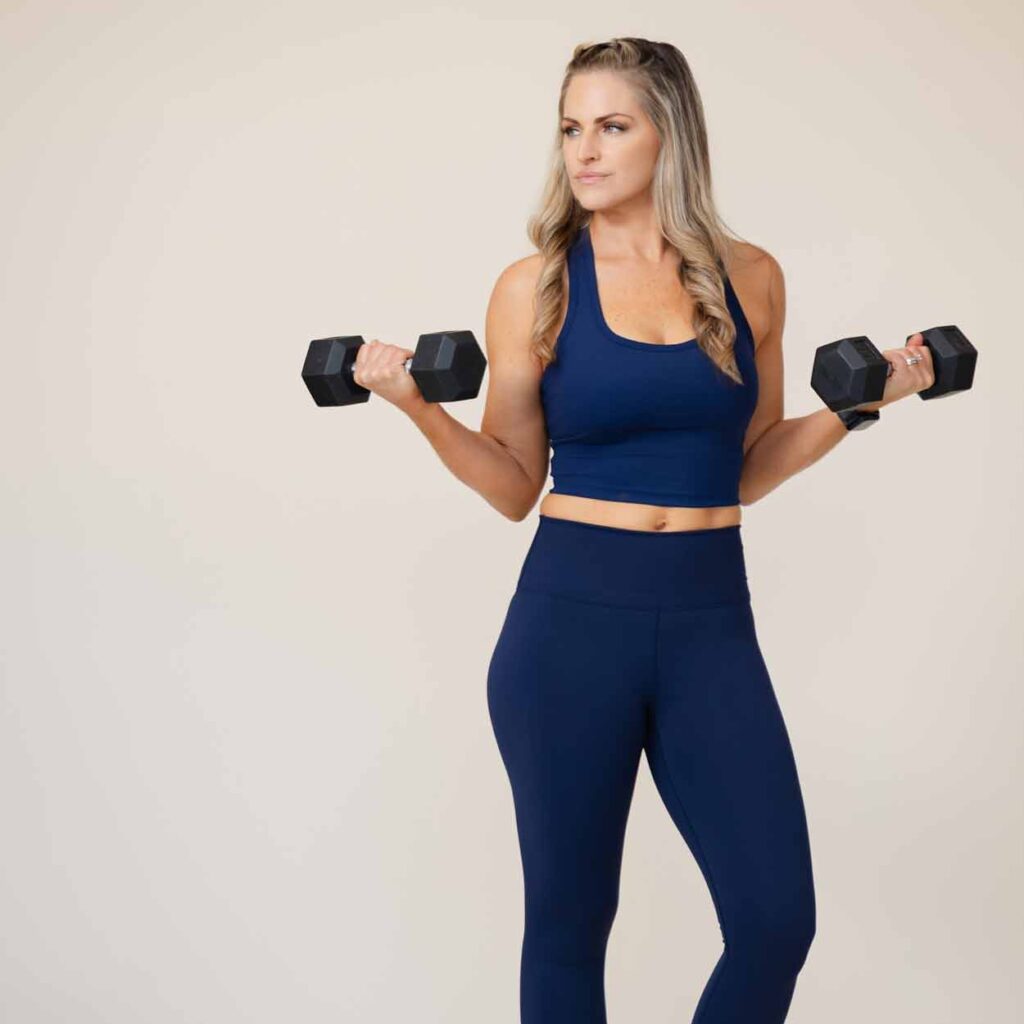If there’s one supplement that deserves more love, especially for women in midlife, it’s creatine. And, since this supplement seems to be having a MAJOR moment on social media right now, this dietitian would like to tell you ALL ABOUT IT!
For far too long, creatine was often associated with male bodybuilders and “gym bros.” However, in recent years, it’s gotten the attention of women, particularly those in midlife, and as a dietitian, I am pleased to see this shift.
Creatine offers numerous benefits for everyday health, including support for muscles and bones, as well as benefits for brain and heart health. As creatine supplements become increasingly popular, I wanted to create this guide to break everything down for you in a clear and approachable way, so that you can go from being confused to being informed. Let’s dive in!
What is Creatine?
- First things first – NO, creatine is NOT a mysterious lab-made substance, and NO, it is NOT a steroid.
- Creatine IS a naturally occurring substance found in foods such as red meat, chicken, and seafood. There are also small amounts of creatine in eggs and milk.
- Creatine is also produced in small amounts by your body. That’s right – your liver and kidneys can make about one gram of creatine a day!
- For my organic chemistry and biochemistry nerds, creatine is a nitrogenous organic acid composed of three amino acids: arginine, glycine, and methionine.
How does Creatine Work In The Body?
Creatine increases your muscles’ stores of phosphocreatine, which helps produce more ATP — the molecule your body uses for quick energy. More ATP means better workouts (AKA better results), faster recovery, and even broader health benefits, including cognitive and cardiovascular support.
Why Would We Want to Take a Supplement if Creatine is Produced in the Body and Found Naturally in Foods?
This is a great question, and I’m glad you asked! I am a food-first, supplement-second dietitian, which means that I do not recommend supplements freely, unless I truly believe they are necessary to SUPPLEMENT something missing in your diet!
As mentioned above, creatine is made up of three amino acids: arginine, glycine, and methionine. Of those three amino acids, glycine is especially challenging to get because it is derived from connective tissue (such as bone broth), which most people don’t consume frequently.
Your body produces about one gram of creatine, and you may get 1 – 2 grams from food each day if you eat foods rich in creatine, like red meat or seafood.
That gets you to a maximum of 3 grams per day, and most people won’t hit this number every single day. This amount is simply insufficient to enjoy all the benefits; hence, a supplement can be beneficial here.
What are the Known Benefits of Creatine?
Creatine supplementation offers a wide range of benefits beyond athletic performance, making it especially valuable during midlife and menopause.
1. Muscle Mass and Strength
- Creatine increases the water content inside muscle cells and stimulates muscle protein synthesis, resulting in stronger, fuller muscles. This is extra crucial during menopause when natural declines in muscle mass and strength increase the risk of frailty, falls, and weight gain.
- Creatine enhances energy availability during exercise, allowing for improved performance and greater strength gains over time. People often ask me if creatine makes your muscles big, and the answer is no. At least, not directly. Creatine provides the extra energy to help you perform faster, lift heavier weights, last longer, and push harder during a workout. Lifting heavier, pushing harder, and lasting longer are what yield the results!
2. Bone Density Support
- Creatine, combined with strength training, has been shown to help maintain or even improve bone density. Studies have found that creatine can increase bone mineral content and slow the loss of bone mineral density. Again (!!), these benefits are most noticeable when creatine is combined with exercise.
- Benefit number one was all about muscle mass, right? Well, stronger muscles place healthy stress on bones, promoting stronger, more resilient bones — an essential defense against osteoporosis.
3. Brain Health and Cognitive Function
- Creatine fuels brain cells by improving energy production, which can enhance memory, attention, and reasoning skills.
- It may help reduce menopause-related brain fog and cognitive decline.
- Some studies suggest that creatine may be neuroprotective, potentially lowering the risk of neurodegenerative diseases over time.
4. Cardiovascular Health
- Creatine may support heart health by improving endothelial function, which helps blood vessels relax and contract efficiently.
- It may also lower levels of homocysteine, an amino acid associated with an increased risk of cardiovascular disease when elevated.
Note: The research on creatine is promising but still inconclusive; therefore, further studies are needed to fully understand its potential benefits for heart health.
5. Energy and Fatigue Reduction
- By boosting ATP production, creatine helps reduce both physical and mental fatigue.
- This translates to better workout performance, higher day-to-day energy, and enhanced resilience to stress and recovery demands.
Creatine for Women in Midlife: Why It Matters for Women in Perimenopause and Menopause
During perimenopause and menopause, the natural decline in estrogen levels can trigger a cascade of changes, including:
- Loss of muscle mass (sarcopenia)
- Decreased bone density (increasing osteoporosis risk)
- Higher risk of cardiovascular disease
- Changes in brain health, including memory lapses and brain fog
Creatine supplementation has been linked to supporting all of these areas. It helps maintain and build muscle mass, supports bone strength, and may promote better cognitive function and cardiovascular health, all of which are particularly important as estrogen levels decline with age.
Menopause experts, such as Dr. Mary Claire Haver and Stacy Sims, have also emphasized the importance of proactive strategies to support women’s health during midlife transitions, and both strongly recommend creatine due to the various benefits.
What Type of Creatine Should I Buy?
Creatine Monohydrate is the gold standard. It’s the most studied, most effective, and most affordable form of creatine. There’s no need to pay more for fancy types like creatine hydrochloride — monohydrate gets the job done beautifully, and research consistently shows that it works!.
Recommended Brand
As a dietitian, I always recommend Klean Athlete Creatine because of its high purity and third-party testing.
Let’s address the elephant in the room: We are NOT sponsored by Klean Athlete in any way. It’s just the brand that I, along with many fellow dietitians, love and trust. That said, I added this product to my Amazon storefront for those who are interested. If you choose to make a purchase after clicking the link, I may receive a small commission at no additional cost to you. If you prefer to avoid Amazon or my storefront, you can easily search for this product on Google and purchase it from a different retailer or directly from the Klean Athlete website.
Recommended Dose
- 3 – 5 grams per day
How to Pick Your Dose
- Take 3 grams daily if you want your creatine to last longer and are okay with slower muscle saturation.
- Take 5 grams daily for faster results, if you’re willing to replenish your supply more frequently.
Do I need to do a Loading Phase?
There’s no need for a “loading phase” (taking high doses for a few days) — daily consistent dosing is just as effective over time.
How to Take It
- Workout Days: Take it 30 minutes before a workout with 8 ounces of water on the days you exercise.
- Rest Days: Take it before any meal — morning, afternoon, or evening. Timing doesn’t matter on non-training days.
Pro Tip: Boost Absorption with Carbs
Taking creatine with a small amount of carbohydrates can enhance its absorption by up to 60% compared to taking it with water alone.
Easy ideas:
- Add two tablespoons of juice to your water with creatine.
- Eat a small fruit, such as a mandarin orange, with it.
- Stir creatine into your non-black coffee if you drink it before workouts. The creamer and/or sweetness gives a little carbohydrate, which can help absorption!
Frequently Asked Questions About Creatine
Is creatine safe?
Yes! Creatine is one of the most well-researched supplements available and is considered safe for healthy individuals, even when used long-term. That said, it’s a good idea to consult your doctor first before starting any supplement!
Why is creatine not recommended for people under 18?
You’ll see this warning on most creatine labels. It’s simply because we don’t have enough long-term studies looking at the safety of creatine use in young athletes. It’s not necessarily because it’s unsafe — there’s just not enough solid data yet.
Is it safe to take creatine when pregnant or breastfeeding?
There is some emerging research suggesting that creatine might protect the brain of the fetus and newborn, but most of this research is based on third-trimester pregnancies in undernourished populations, rather than the typical well-nourished setting. Right now, there just isn’t enough evidence to confidently say it’s safe or effective to take during pregnancy or breastfeeding. That said, if you’re pregnant or postpartum and think you might benefit from creatine supplements, talk to your doctor to determine if it’s appropriate for you!
Does creatine cause bloating or weight gain?
It can cause temporary water retention when you first start it, as it pulls water into your muscles. As a result of this water, you may notice a slight increase of one to two pounds on the scale. But that’s just hydration, not fat gain! This levels out over time, so don’t let the scale distract you — focus on how strong and energized you feel.
Will creatine make me bulky?
Nope! Building serious muscle mass requires a specific, intense training program and eating in a significant calorie surplus (and you gotta have the genetics for it) — creatine alone won’t bulk you up. Remember, creatine can provide you with the energy to lift heavier weights, which may, in turn, result in muscle gain. However, don’t worry; unless you are specifically training and eating (and have the genetics for it), you won’t look like a bodybuilder! Just because creatine helps you lift a dumbbell that is 5 pounds heavier, it does not automatically mean you’ll end up looking like Arnold Schwarzenegger (nothing wrong with his look, but I know many women worry about this)!
Do I need to cycle on and off creatine?
Nope! You can safely take creatine continuously without needing to cycle on and off.
You can safely take it continuously without taking breaks. Some older myths suggested you had to “cycle” it, but research shows that consistent daily intake is perfectly fine and actually better for maintaining the benefits.
Should I take creatine on days I don’t work out?
Yes! Consistency is key with creatine. Even on rest days, you should still take your regular daily dose to keep your muscle stores saturated and maintain all the benefits for your muscles, bones, brain, and heart. Even if you’re just hanging out in your cozy clothes, take your creatine!
When will I notice results?
- Workout performance and recovery: You may start to notice a difference after about 2–4 weeks.
- Muscle and strength gains: Expect to notice bigger changes after 6–8 weeks of consistent strength training and creatine use.
- Brain and cardiovascular benefits: These build up slowly over time — think of it as a long game for better aging.
Bottom Line
As a dietitian — and someone in my mid-30s — I take creatine every single day and encourage many of my clients to consider it too. It’s one of the few supplements that’s not only safe and well-studied but can also truly move the needle on strength, energy, and long-term health. If you’re looking for a simple way to support your muscles, bones, brain, and vitality as you age, creatine might just be your new daily non-negotiable.











Leave a comment
When do u suggest I take creatine if I work out at 4:30 when I get up?
What about women in their eighties who have never taken it before and still exercise?
After some googling, I have read that research shows a slight edge if you take creatine post-workout, but that it is more important to not miss your daily supplement of creatine versus focusing on when to take it.
For me, I have found that the morning works best, that way I don’t forget about it.
I have tried taking the exact creatine you recommend but it cause bloat and unwanted GI side effects. I heard if you slowly build up to the goal amount that it may cause less of the GI side effects? Any recommendations here?